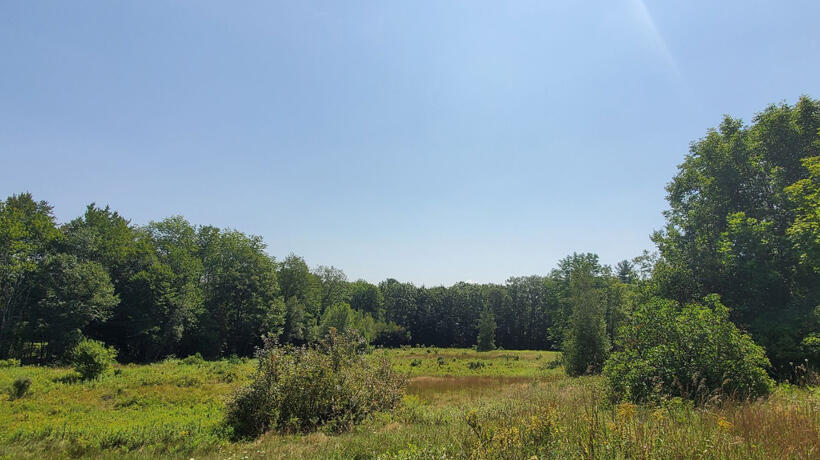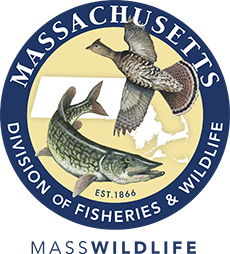- Division of Fisheries and Wildlife
Media Contact for Tully Trail agreement celebrated
Media Contact, MassWildlife

Orange — Representatives from the Department of Fish and Game (DFG), MassWildlife, legislators, North Quabbin Trails Association, and other Tully Trail conservation partners gathered on August 26 at the Tully Mountain Wildlife Management Area (WMA) to mark the signing of a Trail License Agreement between MassWildlife and the North Quabbin Trails Association (NQTA).
Under the terms of the approved agreement, NQTA may conduct trail maintenance activities on six miles of trail segments of the 22-mile Tully Trail. These segments pass through MassWildlife’s Tully Mountain WMA and Tully Mountain Wildlife Conservation Easement in Orange and Fish Brook WMA in Royalston.
“MassWildlife is statutorily responsible for the protection and management of all fish and wildlife in the Commonwealth, and for providing hunting, fishing, trapping and other nature-based recreation opportunities to the public,” said DFG Commissioner Ron Amidon. “While trail development and maintenance are not a core responsibility, we recognize that passage across agency lands is important to maintain the connectivity of existing major trail networks. We are pleased to have approved the agency’s first Trail License Agreement with the North Quabbin Trails Association, which will provide for trail maintenance, wildlife habitat protection, and enhanced outdoor recreation opportunities.”
The 22-mile Tully Trail is a popular hiking trail in the North Quabbin region, passing through public and private property in Orange, Royalston, and Warwick. Much of the trail passes through public land protected or managed by MassWildlife, the state Department of Conservation and Recreation, the U.S. Army Corps of Engineers, the Mount Grace Land Conservation Trust and The Trustees.
In 2016, MassWildlife and the Fisheries and Wildlife Board established a formal Walking Trails Policy designed to protect habitat for wildlife, largely in response to increasing unauthorized trail development and use on MassWildlife’s WMAs. MassWildlife does not develop or maintain walking trails on Wildlife Management Areas but through a Trails License Agreement, will allow maintenance and passage across agency lands to maintain connectivity of six identified existing regional walking trails in the state.
The recently signed Trail License Agreement with NQTA is the first Agreement to be signed with MassWildlife. It spells out the allowed trail maintenance activities and procedures to be carried out by NQTA in accordance with MassWildlife’s Trails Policy, regulations, and wildlife conservation mandate. Specifically, NQTA is authorized to:
- blaze and sign trails year-round without notice to MassWildlife;
- conduct seasonal trail maintenance activities pursuant to the Trail Maintenance plan after notifying MassWildlife; and
- clear existing approved trails on an as needed basis after gaining pre-approval from MassWildlife on timing, location, and utilization of trail clearing tools and methods.
Currently, due to sensitive habitats on some portions of MassWildlife holdings, NQTA is engaged in a permitting process with state and local agencies allowing for re-routing a section of trail off a town road in Orange and providing a suitable stream crossing in Royalston.
MassWildlife has a long and proud history of supporting and promoting wildlife-related recreation through its traditional constituency of hunters, anglers, and trappers, as well as naturalists, birders, photographers, and other outdoor enthusiasts. Wildlife Management Areas are open to wildlife-related recreation and other outdoor activities such as walking, snowshoeing, and cross-country skiing. MassWildlife is committed to providing opportunities for wildlife to thrive and to offering access for the conservation and outdoor recreation community now and into the future.
